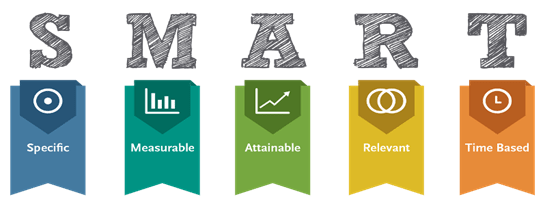We all have faced those exasperating situations where there is so much to study that one doesn’t know where to begin and how to go about studying in a way that will utilise our energy, time and resources to the maximum.
The first step toward effective study preparation is to make study goals.
Goals are a part of every aspect of life. Be it in a game of football or be in the game of life, without goals, you may be heading towards different directions without any sense of purpose or objective.
Setting Study Goals The SMART Way
SMART goal-setting is one of the most effective tools that can be used to achieve the study goals. According to the research done by the University of West Florida, the application of the SMART goals can enhance learning and contributes to the achievement of student learning outcomes.
So, what exactly, is the S.M.A.R.T technique of goal-setting?
The acronym SMART can be used to provide a more comprehensive definition of goal setting:
S – Specific goals
M – Measurable goals
A – Achievable/ Attainable goals
R – Realistic/ Relevant goals
T – Time-based/ Time bound
1. S.M.A.R.T. goal setting: Specific
Specific goals are those that are well defined and clear. In the context of studies, it means to break your syllabus into smaller units and categories that are detailed. Vague or generalised goals are unhelpful because they don’t provide sufficient direction.
It helps to ask yourself: What exactly is it that I want to achieve?
2. S.M.A.R.T. goal setting: Measurable
Measurable goals mean that you identify exactly the different parameters that you want to achieve in the context of study goals. It means breaking your goals into measurable elements.
A simple way of measuring your goals is to include precise chapters, modules, and a particular time frame to measure your degree of success. This could be done by dividing the modules on a daily, weekly or even monthly basis.
A question that you could ask yourself: How will I know that I have achieved it?
3. S.M.A.R.T. goal setting: Achievable
Are your study goals attainable or achievable? Too often, I come across students who make study schedules but find it difficult to follow as they have set very high and unattainable goals/deadlines. This leads to them feeling discouraged resulting in them leaving the study schedule midway and with extremely low levels of self-confidence. And if the goals are too easy, it may result in the student getting bored easily and wasting time. So it’s important to find a balance of setting challenging and yet attainable goals for yourself.
You could ask yourself: Are my study goals actually achievable?
4. S.M.A.R.T. goal setting: Relevant/Realistic
Study goals need to be relevant to the direction of your study course or your career. This may differ with each student based on their aims and ambitions.
Also, the study schedule should be designed in a way that makes these goals realistic for you. So comparing your study goals with your friend or a batch mate may not work as this is about your individual capabilities and each student has different factors to make these goals relevant to them.
It helps to ask yourself: Why am I doing this? / Is it really what I want? / What is the objective behind this goal?
5. S.M.A.R.T. goal setting: Time-based
Any goals that you make needs to have a deadline. When you are working on a deadline, your sense of urgency increases and it gives an accurate sense of the time duration it will take to complete your study goals.
So keep deadlines for yourself and go after them. However, allow yourself some flexibility as well as being too stringent on the time duration of your goal setting may have the reverse effect and may hamper the learning process.
You could ask yourself: When will I achieve this by?
So there you have it – effective, proven and smart study techniques.
Are you having trouble in remembering your lessons and concentrating? With expert guidance and support we have personalised plans help you to stay organised!
